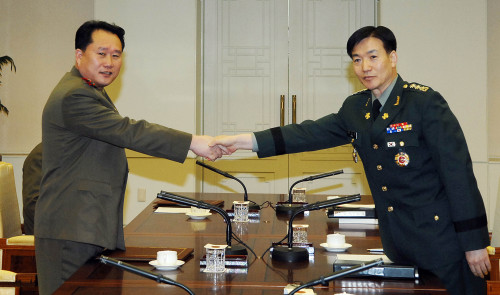Two Koreas fail to narrow differences, agree to hold another talks Wednesday
By Song SanghoPublished : Feb. 8, 2011 - 21:42
The two Koreas failed to narrow their differences at their working-level military talks Tuesday and will hold more talks Wednesday at the inter-Korean border village of Panmunjeom, Seoul’s Defense Ministry said.
The talks, where Col. Moon Sang-gyun and his North Korean counterpart Col. Ri Son-kwon represented each side, were aimed at coordinating details about the venue, date, agenda and level of representatives for the high-level meeting.
Holding four rounds of discussions from 10 a.m. through 7:10 p.m., the two sides struggled to agree over the agenda and other details concerning the high-level meeting, but made no progress, Seoul officials said.
The talks, where Col. Moon Sang-gyun and his North Korean counterpart Col. Ri Son-kwon represented each side, were aimed at coordinating details about the venue, date, agenda and level of representatives for the high-level meeting.
Holding four rounds of discussions from 10 a.m. through 7:10 p.m., the two sides struggled to agree over the agenda and other details concerning the high-level meeting, but made no progress, Seoul officials said.

During Tuesday’s meeting, the South reiterated that the high-level talks should deal with the sinking of the corvette Cheonan in March and the artillery attack on Yeonpyeong Island in November.
However, the North claimed that the proposal to deal only with the two incidents is tantamount to refusing to hold the high-level talks, saying that the agenda should also include measures to address military tensions on the peninsula.
“The South Korean side stressed that discussions on all the other issues are possible after ‘responsible measures’ by the North concerning the sinking of the Cheonan and the artillery attack on Yeonpyeong Island,” said the ministry in a press release.
“We made clear our position that should there be satisfactory results regarding the two incidents at the high-level talks, we can fully discuss other issues including the ones North Korea has raised.”
Also during the talks, the South suggested that the high-level talks be attended by defense ministers or top military officials of the two Koreas while the North suggested the talks be attended by vice minister-level officials.
The working-level talks were the first bilateral military meeting since the one held last September at Panmunjeom.
Proposing holding the preliminary talks on Jan. 20, the reclusive state said that during the high-level talks, it wanted to express its views on the two attacks, and discuss ways to address tensions on the Korean Peninsula.
The Seoul government has continued to maintain a firm stance that the high-level talks can be held only when the communist state takes “responsible measures” for the two unprovoked attacks that together killed 50 South Koreans.
The North appears unlikely to accept their responsibilities for the two deadly incidents.
Although the Seoul-led multinational investigation team concluded last May that a North Korean submarine torpedoed the 1,200-ton vessel in the West Sea, the North has persistently denied its role, calling the investigation results “fabrications.”
The North also argues that the artillery attack on the civilian-inhabited island was a justifiable reaction to initial aggression by the South, which at the time was conducting a live-fire exercise near the western sea border that the North does not recognize.
It is also uncertain who will represent each side should both sides agree to hold the high-level talks. Officials here said that the talks could be attended by defense ministers or general-level officers.
Military officials here, however, believe that it would be difficult for Kim Yong-chun, minister of the North’s People’s Armed Forces, to attend the meeting due to his old age.
Should the talks between the defense chiefs take place, they would be the third of their kind following meetings in 2000 and 2007.
Some others raised the possibility of Kim Yong-chol, director of the North’s general reconnaissance bureau attending the high-level talks. But Seoul officials are reluctant to meet him face to face as he is believed to have plotted the Cheonan sinking.
The working-level talks came as the North has repeatedly been making overtures for inter-Korean dialogue, possibly with ulterior motives.
Experts here believe that through the North’s “offensive for dialogue,” the North seeks to be seen talking the initiative to improve inter-Korean relations that have plunged to new lows over the two attacks.
They also pointed out that the North has been seeking to add to a mood conducive to the resumption of the stalled multilateral denuclearization talks, which could help it ease its economic travails and solidify the ongoing hereditary power succession process.
By Song Sang-ho (sshluck@heraldcorp.com)


![[Exclusive] Korean military set to ban iPhones over 'security' concerns](http://res.heraldm.com/phpwas/restmb_idxmake.php?idx=644&simg=/content/image/2024/04/23/20240423050599_0.jpg&u=20240423183955)

![[Graphic News] 77% of young Koreans still financially dependent](http://res.heraldm.com/phpwas/restmb_idxmake.php?idx=644&simg=/content/image/2024/04/22/20240422050762_0.gif&u=)



![[Pressure points] Leggings in public: Fashion statement or social faux pas?](http://res.heraldm.com/phpwas/restmb_idxmake.php?idx=644&simg=/content/image/2024/04/23/20240423050669_0.jpg&u=)









